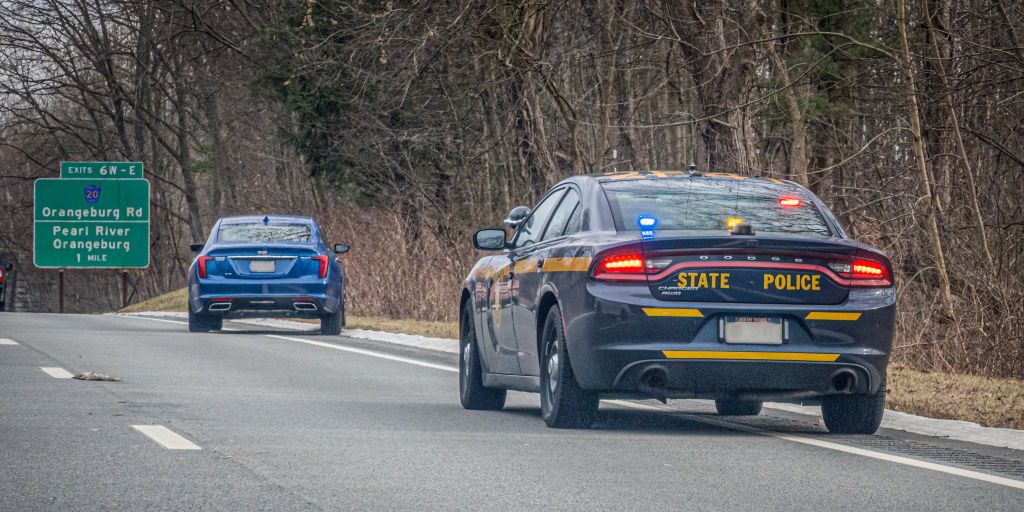Traffic Cops' Jobs Changing as Some Cities Ban Minor Traffic Stops

As cars, drivers, and road rules change, law enforcement strategies must also adjust.In Ann Arbor, Michigan, the city council will vote next month to change the rules surrounding the reasons a police officer can use to pull someone over to reduce racial profiling.In Washington, D.C., the city will send text and mail messages to high-risk drivers, warning them that “Someone in your household is driving dangerously.”
American roads are changing. Whether it’s the challenging public discussion about the best way for police officers to conduct traffic stops or the rise in traffic fatalities during the pandemic, things are different out there. That’s why, from Michigan to New York, strategies to make roads safer for everyone are changing, too.
In Michigan, the Ann Arbor City Council voted 9–0 earlier this month to propose a new law that would reduce police officers’ ability to pull someone over for “minor offenses.” The proposed Driving Equality Ordinance draws a line between routine traffic stops and eventual incarceration outcomes for Black, Indigenous, and People of Color (BIPOC). The council’s proposed solution is to take away an officer’s right to pull someone over for minor offenses such as a cracked windshield.
Interesting New Ways to Get a Ticket
The stakes for these pretextual stops can also be higher than being locked up, too. “The harms of traffic stops are not equally felt,” the proposal reads. “More than a quarter of people killed in traffic stops are Black, despite Black people making up only 12 percent of the population.” The proposal also notes that stops for minor offenses “are disproportionately carried out against people of color and return negligible public safety benefits.”
“When you get pulled over, you have to wonder if I did something wrong or am I being profiled,” the founding chairperson of Ann Arbor’s Independent Police Oversight Commission, Lisa Jackson, told local ABC 7 News.
A final vote on the proposed law is scheduled for early July. Bigger cities, including Pittsburgh and Philadelphia, have passed similar legislation in recent years, as Bloomberg has reported.
Unwelcome Texts from the City
Over in Washington, D.C., the city’s Department of Transportation has a different idea to reduce the number of traffic deaths, crashes, and other traffic violations. In partnership with The Lab @ D.C. (a part of the city government), the city will send text messages and physical mail to drivers who have had some sort of traffic citation or violation. The customized messages are meant to get drivers to think about their actions and will reference details about the driver’s vehicle, the violations it has been connected to in the past and a warning that the vehicle is at higher risk of a crash than others because of this history.
According to the Washington Post, one of the mailers includes the text: “Someone in your household is driving dangerously. Your vehicle has a history of speeding and/or running red lights and this is placing the drivers and passengers of your vehicle at a high risk of getting into a crash.”
The city created a list of 100,000 high-risk drivers, and a subset of these people will get the text or mail messages (or both). Drivers can opt out of the messages after the first one. During the 12-month program, the DOT and The Lab will then see which category of drivers, if any, see any noticeable improvements.
“The goal is to create awareness, regardless of whether or not anybody has signed off for specific alerts,” The Lab director Sam Quinney told the Post.
Contributing Editor
Sebastian Blanco has been writing about electric vehicles, hybrids, and hydrogen cars since 2006. His articles and car reviews have appeared in the New York Times, Automotive News, Reuters, SAE, Autoblog, InsideEVs, Trucks.com, Car Talk, and other outlets. His first green-car media event was the launch of the Tesla Roadster, and since then he has been tracking the shift away from gasoline-powered vehicles and discovering the new technology’s importance not just for the auto industry, but for the world as a whole. Throw in the recent shift to autonomous vehicles, and there are more interesting changes happening now than most people can wrap their heads around. You can find him on Twitter or, on good days, behind the wheel of a new EV.



